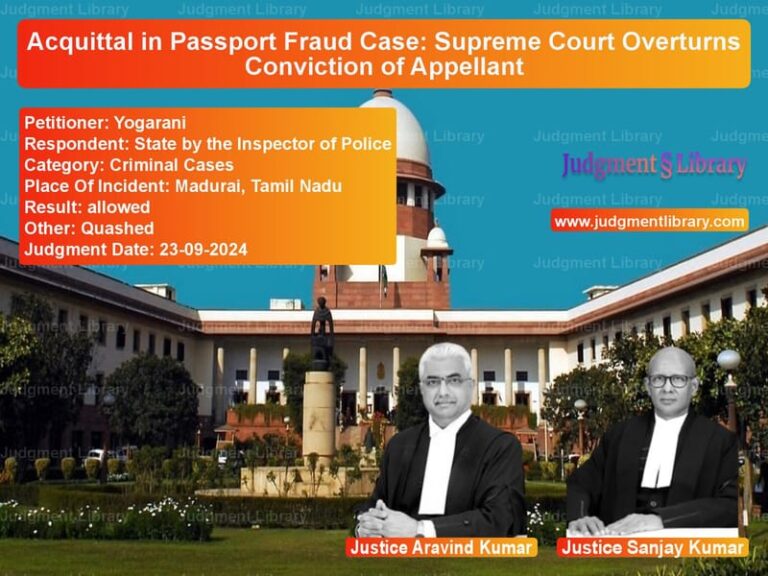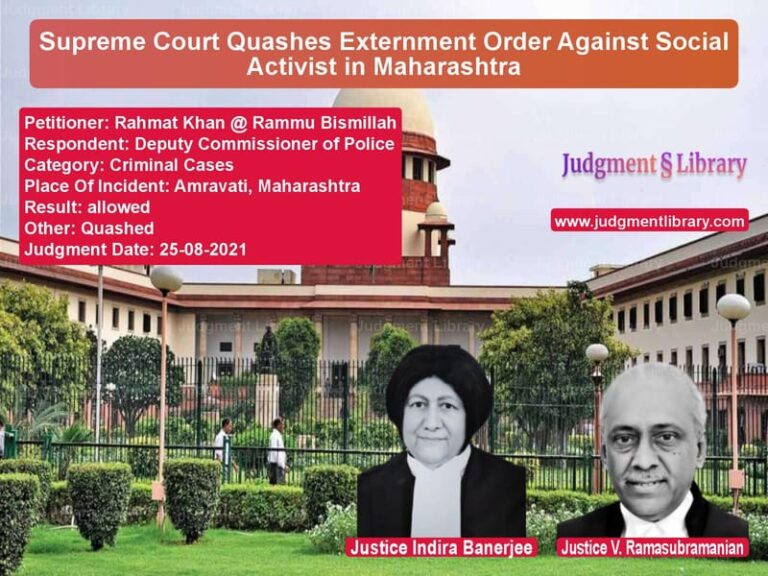Fraudulent Land Assignment and Supreme Court’s Landmark Ruling
The Supreme Court of India, in its judgment in Karunakaran vs. V. Padmini & Ors., addressed a crucial issue regarding fraudulent land assignments under the Kerala Land Reforms Act, 1963. The court set aside the orders of the Kerala High Court and upheld the decision of the District Collector to revoke an illegally obtained land assignment. The ruling reinforces that fraud vitiates all contracts and that government authorities retain the power to correct such irregularities.
Background of the Case
The case concerns land originally declared surplus under the Kerala Land Reforms Act, 1963. The respondent, V. Padmini, had initially applied for tenancy rights in 1962 but failed to establish them. Later, in 1988, she applied for an assignment of 8 cents of land, falsely claiming to be a landless agricultural laborer. The District Collector, based on this claim, granted her 6 cents of land in 1991.
Subsequent investigations revealed that the respondent was, in fact, a business owner running an aluminum industry, paying both income and sales taxes, thereby disqualifying her from claiming land under the assignment scheme meant for genuine landless agricultural laborers.
Legal Framework
The Kerala Land Reforms Act, 1963, was enacted to redistribute land to landless agricultural laborers. However, it has often been misused through fraudulent claims. Section 96 of the Act strictly prohibits the misrepresentation of facts to obtain land assignments. Additionally, Rule 29(8) of the Kerala Land Reforms (Ceiling) Rules, 1970, empowers the government to revoke such assignments if obtained through fraud.
Chronology of Events
- 1962: Respondent No.1 applied for tenancy rights but failed.
- 1988: Respondent applied for land assignment, claiming to be a landless agricultural laborer.
- 1991: District Collector assigned 6 cents of land.
- 2003: District Collector revoked the assignment after discovering fraudulent claims.
- 2005: Kerala High Court ruled in favor of the respondent.
- 2017: Supreme Court overturned the High Court’s ruling and upheld the District Collector’s decision.
Petitioner’s Arguments
- The respondent misrepresented her status as a landless agricultural laborer when she was, in fact, a business owner.
- The original tenancy claim was fraudulent as she was only 10 years old in 1962, making the lease agreement invalid.
- Government land cannot be obtained through misrepresentation and must be used for its intended purpose.
- As per Rule 29(8), the government has the authority to revoke assignments obtained through fraud.
Respondent’s Arguments
- The assignment had been legally granted by the authorities.
- Past failures to obtain tenancy rights should not affect the legitimacy of the assignment.
- The District Collector lacked the authority to revoke the assignment.
- The cancellation of the assignment violated principles of natural justice.
Supreme Court’s Key Observations
- Fraud Vitiates All Transactions: The Court reaffirmed that any transaction obtained through fraudulent means is void.
- Public Land Must Serve Public Interest: The government has a duty to ensure that land meant for redistribution is given only to deserving individuals.
- Misrepresentation Cannot Create Rights: The respondent’s claim was based on false information, and thus, no enforceable rights could be derived from it.
- Authorities Have the Right to Revoke: The District Collector acted within legal bounds by canceling the assignment.
Legal Precedents Cited
- State of U.P. vs. Lalji Tandon (2004): Leaseholders do not acquire ownership rights over public land.
- Jaspal Singh vs. State of Punjab (2015): Government land cannot be held indefinitely based on false claims.
- M.C. Mehta vs. Union of India (1987): Fraudulent claims on public resources cannot be upheld.
Supreme Court’s Final Judgment
The Supreme Court overturned the Kerala High Court’s ruling and reinstated the decision of the District Collector. The judgment emphasized:
- Land assigned under government schemes cannot be fraudulently obtained.
- Authorities have the power to review and revoke assignments obtained through misrepresentation.
- The respondent had no legal right to the land as she was not a genuine beneficiary.
- Fraudulent transactions must be rectified, even if they have remained in place for a long time.
Implications of the Judgment
- Prevents Misuse of Land Laws: This ruling serves as a precedent to prevent fraudulent land acquisitions.
- Upholds Government’s Authority: It reinforces the government’s right to correct errors and revoke wrongful assignments.
- Encourages Transparency: Ensures that land redistribution programs reach the intended beneficiaries.
Conclusion
The Supreme Court’s judgment in Karunakaran vs. V. Padmini & Ors. establishes an important legal precedent in preventing fraudulent land acquisitions. It ensures that government schemes designed for landless agricultural laborers are not misused by individuals seeking undue benefits. The ruling affirms that fraud cannot create legal rights and that government authorities have the discretion to correct such irregularities in public interest.
Don’t miss out on the full details! Download the complete judgment in PDF format below and gain valuable insights instantly!
Download Judgment: Karunakaran vs V. Padmini & Ors. Supreme Court of India Judgment Dated 28-03-2017.pdf
Direct Downlaod Judgment: Direct downlaod this Judgment
See all petitions in Property Disputes
See all petitions in Landlord-Tenant Disputes
See all petitions in Legal Malpractice
See all petitions in Judgment by Madan B. Lokur
See all petitions in Judgment by Deepak Gupta
See all petitions in allowed
See all petitions in supreme court of India judgments March 2017
See all petitions in 2017 judgments
See all posts in Civil Cases Category
See all allowed petitions in Civil Cases Category
See all Dismissed petitions in Civil Cases Category
See all partially allowed petitions in Civil Cases Category







